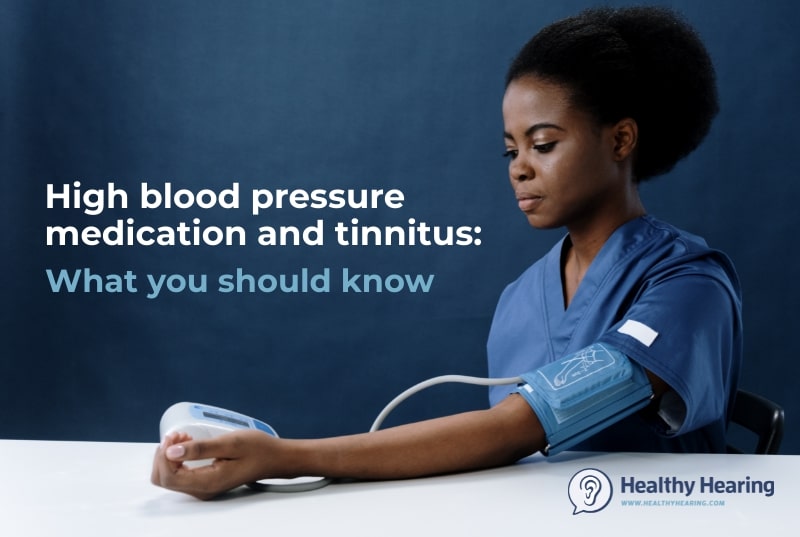|
www.HealthyHearing.com |
What to know about tinnitus and blood pressure drugsIf you experience ringing in the ears, talk to your doctor
Contributed by Patricia Weiser, PharmD Key points:
If you take medication for high blood pressure (also known as hypertension) and are experiencing tinnitus, it could be related. That's because some—but not all—blood pressure medications are associated with tinnitus. 
Unfortunately many different medications have ototoxic side effects, especially blood pressure drugs, notes Dr. Melissa E. Heche, AuD, a voice pathologist and musician specialist at New York Speech and Hearing. It isn’t entirely clear why certain blood pressure medications (aka BP meds or antihypertensives) are more likely to provoke tinnitus than others. It’s been suggested that tinnitus is caused by a reduction in cochlear blood flow that occurs when blood pressure is lowered by medication. Blood pressure medications connected to tinnitusAccording to medical literature and analyses of adverse event reporting systems, the following types of BP medications are most commonly associated with tinnitus: Angiotensin-converting enzyme inhibitors (ACEIs). “ACE inhibitors, such as lisinopril, enalapril, and ramipril, have a positive association with tinnitus/ototoxicity occurrence,” says Heche. Other examples of ACEIs include: benazepril, captopril, fosinopril and quinapril. Diuretics. While all types of diuretics have been implicated in tinnitus, the thiazide and potassium-sparing categories are most closely connected. Common thiazide diuretics include: hydrochlorothiazide (“HCTZ”) and chlorthalidone. Examples of potassium-sparing diuretics are spironolactone and triamterene. Calcium channel blockers. Calcium channel blockers are a common potential cause of tinnitus. Examples include amlodipine, diltiazem, nicardipine, and nifedipine. Certain beta blockers. “Some instances of beta blockers have been associated with tinnitus or other means of ototoxicity, such as bisoprolol and metoprolol,” Heche says. Carvedilol is also connected to hearing loss, according to a 2018 study in the International Journal of Audiology. Blood pressure medications not connected to tinnitusWhile exceptions are possible, certain blood pressure medications are not associated with tinnitus. They include: Angiotensin II receptor blockers (ARBs). When taken as monotherapy (meaning without other BP meds), most ARBs are not linked to tinnitus. Examples of ARBs include:
Some reports of tinnitus have occurred with certain ARBs—irbesartan, losartan, and valsartan—but mainly when taken in combination with diuretics. Certain beta blockers. Yes, beta blockers appear on both the offenders and non-offenders lists. “For the most part, beta blockers are not typically associated with tinnitus occurrence,” Heche explains. Labetalol, for example, does not seem to be linked to ringing in the ears. Talk with your healthcare providerIf you experience any new hearing-related side effects when taking a drug, be sure to tell your doctor. They may be able to switch medications or try a different dosage. Do not “If you are prescribed one of these medications and it immediately causes the sensation of tinnitus, a conversation with your primary care physician or cardiologist might be necessary to see if there’s an alternate medication that can be utilized,” Heche says. Usually not a permanent changeThe good news is that tinnitus stemming from blood pressure medications does not seem to be permanent. According to treatment guidelines from the American Academy of Otolaryngology, tinnitus typically goes away within 1-2 weeks of stopping the offending blood pressure medication. But talk to your doctor before stopping to make sure this is the best decision for you. The severity of drug-induced tinnitus seems to increase with dosage. So, it’s also possible that your healthcare provider might try to lower your dose in attempt to alleviate your tinnitus symptoms. Again, don’t change your dosage without your provider’s recommendation. If hearing problems persist, "it's important to have a consultation with an audiologist," Heche says. A complete hearing exam, which should include a full tinnitus evaluation and testing of hearing in the extra high frequencies, is recommended to measure the baseline level of function, and determine a treatment plan to address the tinnitus. More: |
Featured clinics near me
Earzlink Hearing Care - Reynoldsburg
7668 Slate Ridge Blvd
Reynoldsburg, OH 43068

Find a clinic
We have more hearing clinic reviews than any other site!

